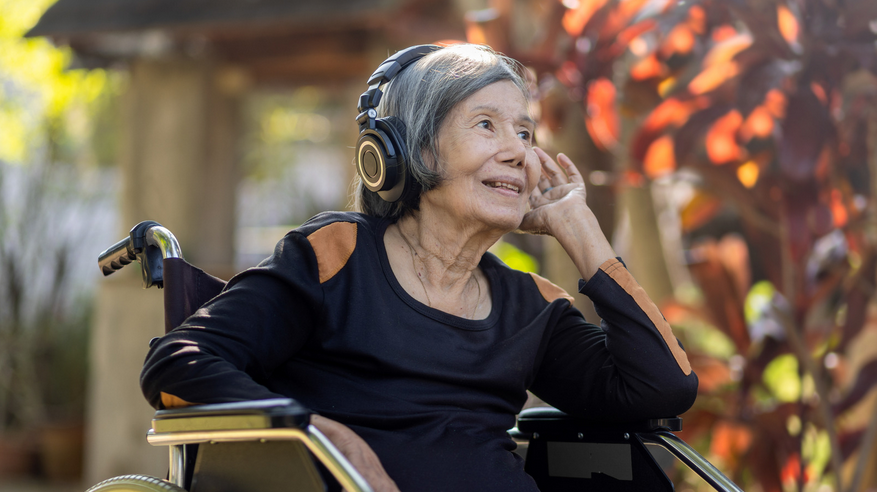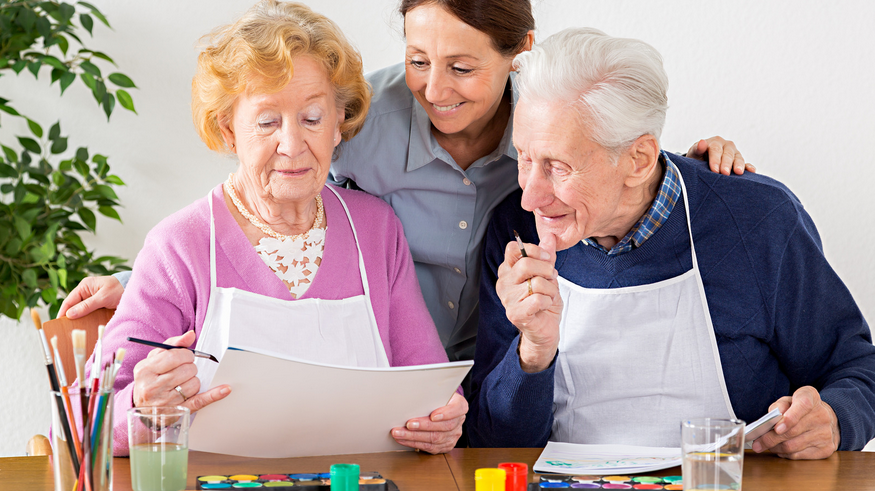Engaging Activities for Elderly with Dementia: Ideas to Keep Them Active and Stimulated

As our loved ones age, keeping them active and engaged in fulfilling activities is important. This is especially true for those with dementia, who may experience a decline in cognitive function and memory loss. Activities can help improve their quality of life, boost their mood, and even slow cognitive decline. However, as caregivers and loved ones, it can be challenging to develop appropriate and engaging activities for the elderly with dementia.
This article will provide practical ideas and tips for engaging in activities suitable for the elderly with dementia. Incorporating these fun activities into their daily routines can help keep your loved ones active, stimulated, and fulfilled.
Choosing Appropriate Activities for Seniors
When selecting activities for elderly with dementia, it’s important to take into account their interests, abilities, and needs. Activities that are too complex or challenging may lead to frustration and agitation, while activities that are too simple or repetitive may not provide enough stimulation. Here are some tips for choosing appropriate activities for seniors:
- Consider their interests: Think about the individual’s hobbies, pastimes, and favorite activities. Familiar and enjoyable activities can help evoke positive memories and emotions.
- Assess their abilities: Evaluate their physical abilities, cognitive function, and sensory processing. Pick activities that are within their capabilities and don’t overwhelm them.
- Provide a variety of activities: Offer a range of activities that stimulate different senses and cognitive functions. This can help prevent boredom and promote engagement.
- Be flexible: Be prepared to adapt activities based on the individual’s needs and preferences. What works for one person may not work for another.
Engaging Activities for Elderly with Dementia
Examples of appropriate activities include reminiscing, music therapy, and sensory stimulation. In the following sections, we’ll explore these activities for people in more detail and provide practical ideas for each.
1. Reminiscing Activities for Elderly with Dementia

Engaging people with dementia through reminiscing activities can be a powerful tool to stimulate cognitive function and evoke positive emotions. These activities involve recalling and sharing memories from the past. Here are some practical ideas for engaging in reminiscing activities:
- Look at old photos: Gather family photos and photo albums and look through them together. Encourage the individual to share stories and memories associated with each photo.
- Share stories: Ask the individual to share stories from their past, such as childhood memories, family traditions, or significant life events. Active listening and engagement can help promote conversation and encourage reminiscing.
- Use props: Bring in familiar objects or props that can help evoke memories, such as old toys, kitchen utensils, or clothing. Encourage the individual to touch and interact with these objects while sharing memories associated with them.
- Watch old movies or TV shows: Watching old movies or TV shows can help stimulate memories and spark conversation. Encourage the individual to share their thoughts and memories associated with the show or movie.
- Share favorite music: Music can be a powerful trigger for memories and emotions. Play familiar and enjoyable music to the individual, and encourage them to share memories associated with the music.
Through reminiscing activities, you can help the individual stimulate their senses and trigger positive memories, emotions, and connections. This can help to improve their cognitive function and mood.
2. Music Activities for Elderly with Dementia

Music has the power to elicit emotions, inspire feelings, and trigger sensory memories. It can also help elderly individuals with dementia engage, communicate, and enjoy themselves. Music therapy effectively engages your elderly loved one in musical experiences that can improve their quality of life. Here are some practical ideas for incorporating music therapy into your loved one’s routine:
- Play familiar music: Choose music that is familiar and enjoyable to the individual. This can help evoke positive memories and emotions.
- Encourage singing and movement: Encourage the individual to sing along or move to the music. This can help promote engagement and physical activity.
- Use music for relaxation: Playing soft, calming music can help promote relaxation and reduce agitation and anxiety.
- Create a playlist: Create a personalized playlist of favorite songs and music that holds special meaning for the individual.
- Attend a music therapy session: Consider attending a music therapy session with a trained professional. They can provide personalized music therapy and help tailor activities to the individual’s needs and preferences.
Through music, you can help the individual communicate emotions and express themselves in a non-verbal way. This can help improve mood, increase communication, and stimulate cognitive function.
3. Sensory Stimulation Activities for Elderly with Dementia

Sensory stimulation can be a powerful tool for engaging elderly individuals with dementia. It can enhance cognitive function, promote engagement, and reduce stress and anxiety. These activities include stimulating the senses through touch, sound, sight, taste, and smell. Here are some practical ideas for incorporating sensory stimulation into your elderly loved one’s routine:
- Use scents: Bring in familiar scents that the individual enjoys, such as lavender, vanilla, or citrus. This can help promote relaxation and evoke positive memories.
- Provide tactile stimulation: Offer objects with different textures, such as soft blankets, furry stuffed animals, or rough sandpaper. Encourage the individual to touch and interact with these objects.
- Display familiar objects: Display familiar objects or mementos, such as family photos, favorite books, or special keepsakes. This can help evoke positive memories and promote engagement.
- Offer taste stimulation: Provide familiar foods and drinks that the individual enjoys. Encourage them to taste and savor the flavors.
- Use light and color: Use colorful objects or lighting to create a stimulating environment. This can help promote visual engagement and interest.
Through sensory stimulation, you can help the individual better engage and express themselves through their senses. This can improve mood and reduce anxiety.
4. Creative Activities for Elderly with Dementia

Finding meaningful and engaging activities can be a challenge for seniors with dementia. But research has shown that creative activities can provide numerous benefits, such as reducing agitation, improving mood, and enhancing the overall quality of life. If you’re caring for a loved one with dementia, incorporating creative activities into their daily routine can help them stay mentally and emotionally stimulated and connect with their inner selves.
Here are some creative activities that can help your elderly loved one with dementia:
- Painting and drawing: Art therapy can provide an outlet for creative expression and stimulate the brain. Painting and drawing can help seniors with dementia communicate their thoughts and feelings, improving their mood and reducing anxiety. Try providing them with different materials, such as watercolors, pastels, or crayons, and let their creativity flow.
- Craft projects: Seniors with dementia can enjoy creating a wide variety of crafts, such as knitting, crocheting, or making seasonal decorations. These activities can help them to feel productive and engaged, and the tactile experience of working with materials can be calming and enjoyable.
- Personalized puzzles: Puzzles can be a fun way for seniors with dementia to exercise their brains and improve their cognitive function. Creating a personalized puzzle from a family photo or favorite image can add enjoyment and personal meaning to the activity.
- Collage making: Creating a collage from a variety of images and materials can be an excellent way for seniors with dementia to express themselves creatively. This activity can also help them to remember important people, places, and events from their lives.
5. Technology-based Dementia Activities for Dementia Patients

Technology has advanced significantly in recent years, providing new and exciting opportunities to help individuals with dementia. These activities are designed to be engaging, fun, and interactive, helping to promote cognitive function and memory retention. Here are some examples of technology-based dementia activities for elderly individuals:
- Virtual Reality: Virtual reality is a new technology that has been shown to be effective in helping individuals with dementia. It can transport individuals to different environments, providing new and exciting experiences. This can help stimulate their senses, improve their mood, and reduce anxiety and depression.
- Travel the globe with Google Earth: With Google Earth, seniors can explore the world from their home! They can use the platform to visit famous landmarks, explore different cultures, and learn about the history of different countries. Google Earth is an excellent way to keep seniors engaged and stimulated while providing a fun and educational activity.
- Explore the globe through live cams: Another great way to engage seniors with dementia is by using live cams to explore the world. Many zoos, museums, and other attractions offer live cams that allow seniors to watch animals, exhibits, and other interesting sites in real-time. This is a great way to bring the world to seniors who may be unable to travel or leave their homes.
Final Thoughts
Keeping an elderly loved one with dementia active and stimulated is crucial for their overall well-being and quality of life. Engaging in activities can improve their cognitive abilities, reduce anxiety, and promote a sense of purpose and happiness.
However, as much as we want to be there for our loved ones, we cannot always be available to accompany them in these activities. That’s where professional caregivers, like those at Serenity Senior Care, can provide invaluable support.
Here at Serenity Senior Care, our trained caregivers are committed to enhancing the lives of elderly individuals with dementia. They can assist your loved one with engaging activities, such as gardening, music therapy, and art projects while ensuring their safety and comfort.
If you are unable to be there for your loved one on a regular basis, you can rely on the compassionate care of our caregivers. With our support, your elderly loved one can continue to live a fulfilling and active life, despite the challenges of dementia.
Don’t hesitate to contact Serenity Senior Care to learn more about our services and how we can help your loved one. Let us work together to provide the best possible care for your beloved elder.


